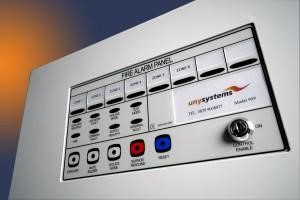Fire is a hazard that can have a disastrous impact on people’s homes and lives alike, so it is important to try to detect and prevent it wherever possible. From seeking automist installers for active anti-fire measures to using passive alternatives, here are some of the best systems you can harness to keep your home and your family safe.

Fire alarms
Most modern homes and many older properties now feature integrated fire alarm systems that are present on every floor of the house and can monitor the environment to detect fires before they get out of control, with mains power ensuring that you do not need to worry about batteries being depleted.
You can even invest in wireless fire alarms that can be controlled from a central panel, enabling you to install them in hard to reach places without hassle. For rooms where smoke detection is inconvenient, heat detectors and flame detectors are available.
Sprinkler systems and Automist
Traditional sprinkler systems that are activated in the event of a fire being detected are not entirely common in a domestic setting but there are modern alternatives that are cheaper to integrate where they are needed; in fact, many large institutions are being urged to embrace sprinkler systems to combat fire hazards that regularly crop up in their sector.
One system from Plumis is particularly impressive, offering active fire suppression in homes where other solutions would be impractical. Installers and specialists such as Fire risk assessment Bristol company http://keloscape.co.uk/fire-risk-assessment will be able to advise homeowners, businesses and property developers about the right kind of fire suppression set-up to suit their particular circumstances. It is important when running a business that you seek help from professionals such as the one mentioned in order to ensure that you are fire safety compliant.
Fire extinguishers
One of the most effective means of combating fires at home is, of course, the traditional fire extinguisher, whether filled with water, carbon dioxide, dry powder or foam. There have even been interesting recent developments in extinguisher technology that use sound waves to put out fires, although such products are not yet commercially available.
Make sure you have the right type of extinguisher for the job; for example, in the kitchen a CO2 extinguisher will be safer than a water variant because it can deal with flammable liquids and electric fires without putting users at risk. Whichever system you select, ensure that you have some means of fire detection and prevention at your disposal.


